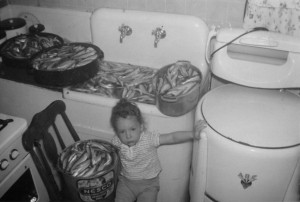 Most little kids don’t really like fish much, unless it is in the form of fish sticks, and I don’t think fish sticks existed when my sister, Cheryl and I were little girls. I don’t know why Cheryl wanted to have her picture taken with all these fish, or if my mom just set her there because she would be a good point of reference to show just how many fish there were here, but I do know that it would have been a good thing that the fish were dead already, because if they had been flipping around, Cheryl would have probably been freaking out for sure…I know I would have, but then I was a baby. The fish were Smelt, and there were lots of them.
Most little kids don’t really like fish much, unless it is in the form of fish sticks, and I don’t think fish sticks existed when my sister, Cheryl and I were little girls. I don’t know why Cheryl wanted to have her picture taken with all these fish, or if my mom just set her there because she would be a good point of reference to show just how many fish there were here, but I do know that it would have been a good thing that the fish were dead already, because if they had been flipping around, Cheryl would have probably been freaking out for sure…I know I would have, but then I was a baby. The fish were Smelt, and there were lots of them.
Rainbow Smelt, which are silver-colored fish about 6 to 9 inches long, are not native to Lake Superior, but rather to the Atlantic and Pacific Oceans. Smelt entered the Great Lakes accidentally in 1912 when they escaped from an inland lake in Michigan where they had been stocked as forage fish. After that, they quickly spread throughout Lake Michigan and were finally discovered in Lake Superior in 1946. By that time, Sea Lamprey, which had also invaded Lake Superior, had begun reducing the number of native lake Trout, so there were far less Trout to eat the Smelt and they began to rapidly increase in number. Every year in mid-April, the Smelt head for the streams to lay their eggs. They are light sensitive, so smelting must be done at night. The best place to go smelting is at the mouth of the streams where they enter the Lakes. The rapids make it more difficult for the fish to jump over them into the stream, and so they are in abundance at that place. Smelting was a big deal at the time we were living in Superior, Wisconsin, when Cheryl and I were little girls.
When April came around in 1957, Mom, Dad, Uncle Bill, and Aunt Doris took Cheryl, me, and our cousin, Pam, and went smelting. Of course, the women pretty much just watched the proceedings, while Dad and Uncle Bill gathered up the buckets of fish that would be our haul for the evening. It was a good run, and the amount of fish they took home was amazing. The fish were then cleaned and frozen for lots of good eating down the road. I’ve never been smelting, at least where I actually participated, but I can imagine that it was pretty exciting to see all those fish all at once. usually think of fishing as a lazy day sport, and normally it is, but during a smelting run, it sounds pretty exciting to me!!


2 Responses to Accidental Habitation